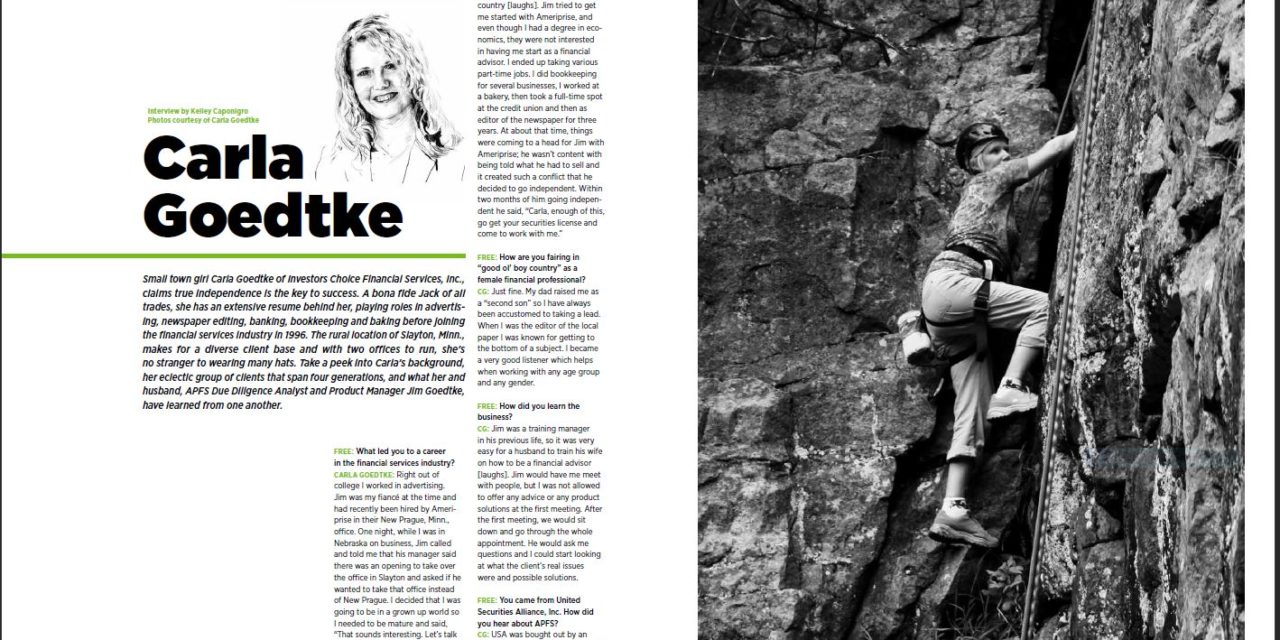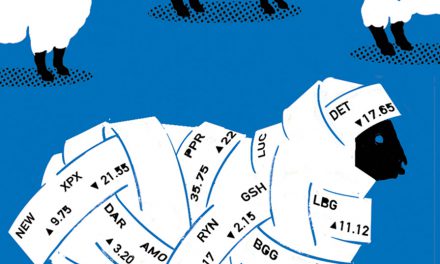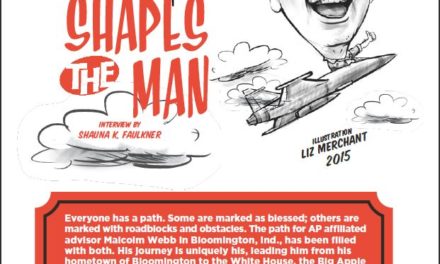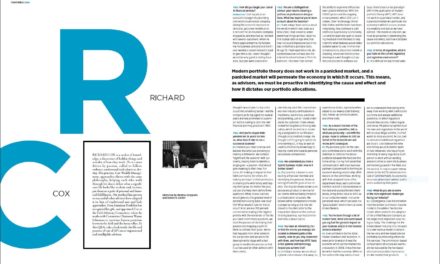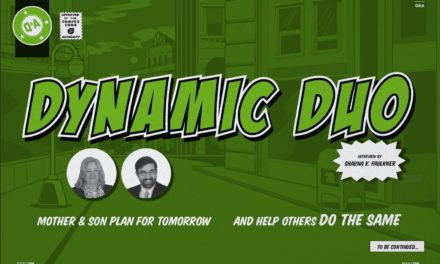
FREE 7.2 Q&A – Carla Goedtke
Small town girl Carla Goedtke of Investors Choice Financial Services, Inc., claims true independence is the key to success. A bona fide Jack of all trades, she has an extensive resume behind her, playing roles in advertising, newspaper editing, banking, bookkeeping and baking before joining the financial services industry in 1996. The rural location of Slayton, Minn., makes for a diverse client base and with two offices to run, she’s no stranger to wearing many hats. Take a peek into Carla’s background, her eclectic group of clients that span four generations, and what her and husband, APFS Due Diligence Analyst and Product Manager Jim Goedtke, have learned from one another.
To view the full article please register below:
FREE 7.2 Q&A – Carla Goedtke
Small town girl Carla Goedtke of Investors Choice Financial Services, Inc., claims true independence is the key to success. A bona fide Jack of all trades, she has an extensive resume behind her, playing roles in advertising, newspaper editing, banking, bookkeeping and baking before joining the financial services industry in 1996. The rural location of Slayton, Minn., makes for a diverse client base and with two offices to run, she’s no stranger to wearing many hats. Take a peek into Carla’s background, her eclectic group of clients that span four generations, and what her and husband, APFS Due Diligence Analyst and Product Manager Jim Goedtke, have learned from one another.
FREE: What led you to a career in the financial services industry?
Carla Goedtke: Right out of college I worked in advertising. Jim was my fiancé at the time and had recently been hired by Ameriprise in their New Prague, Minn., office. One night, while I was in Nebraska on business, Jim called and told me that his manager said there was an opening to take over the office in Slayton and asked if he wanted to take that office instead of New Prague. I decided that I was going to be in a grown up world so I needed to be mature and said, “That sounds interesting. Let’s talk about it when I get back home.” I came home to find out that instead of moving to the Twin Cities, we would be moving back to farm country [laughs]. Jim tried to get me started with Ameriprise, and even though I had a degree in economics, they were not interested in having me start as a financial advisor. I ended up taking various part-time jobs. I did bookkeeping for several businesses, I worked at a bakery, then took a full-time spot at the credit union and then as editor of the newspaper for three years. At about that time, things were coming to a head for Jim with Ameriprise; he wasn’t content with being told what he had to sell and it created such a conflict that he decided to go independent. Within two months of him going independent he said, “Carla, enough of this, go get your securities license and come to work with me.”
FREE: How are you fairing in “good ol’ boy country” as a female financial professional?
CG: Just fine. My dad raised me as a “second son” so I have always been accustomed to taking a lead. When I was the editor of the local paper I was known for getting to the bottom of a subject. I became a very good listener which helps when working with any age group and any gender.
FREE: How did you learn the business?
CG: Jim was a training manager in his previous life, so it was very easy for a husband to train his wife on how to be a financial advisor [laughs]. Jim would have me meet with people, but I was not allowed to offer any advice or any product solutions at the first meeting. After the first meeting, we would sit down and go through the whole appointment. He would ask me questions and I could start looking at what the client’s real issues were and possible solutions.
FREE: You came from United Securities Alliance, Inc. How did you hear about APFS?
CG: USA was bought out by an acquiring broker/dealer so it was either go to that firm or go somewhere else—we made a pretty immediate decision to go somewhere else. It just happened so fast. My major concern was finding a place that could handle my eclectic book of business and American Portfolios seemed to be the right fit.
FREE: How and where did you build your book of business?
CG: When Jim and I were with USA, we each had our own books of business. Jim left to go to Ameriprise and set up their alternatives department; he couldn’t be a producing rep anymore, so we moved his whole book of business to me. He likes to joke that I’m the only person that has ever gotten a husband to turn over all of his assets without the help of an attorney [laughs].
FREE: What are your feelings about being independent as a financial advisor?
CG: You know, some firms call themselves “independent,” but when it’s dictated to an advisor that their pay will be adjusted based on what products they sell or by what proportion of products they sell, they’re not truly independent. You start to wonder, is the advisor selling this product because they get paid more? Or do they truly believe it’s the right product? It just brings up all sorts of ethical questions for me. I like being truly independent with American Portfolios.
FREE: Can you explain your business product mix and how it has changed, if at all, over the years?
CG: My business is definitely eclectic. When I started it was primarily just mutual funds and annuities, and then over the years—and as my client base grew—it changed. Now I have quite a few 403(b) groups and 401(k) groups. Where Jim might have worked with just a business owner on a personal level, I now work with the business owner on a professional level, including what services they provide to their employees. I do a lot of long-term care and health insurance and alternatives for some of our sophisticated investors. Advisory business has been a steadily growing part
of my platform; in fact, it’s probably the largest growing right now.
FREE: Do you consider yourself more of an asset manager or an asset gatherer?
CG: Manager. It’s kind of weird because if you manage, it will gather. I struggle with that at different times; I have to consider what I’m spending time doing. If you manage somebody’s money well, they’ll tell other people.
FREE: What is the most difficult part of running your own business?
CG: The 5,000 hats that you have to wear! I recently met with a client who is also a business owner. I asked him, “How are the joys of business ownership going?” He looked at me with an exasperated face! I said, “You know, all of those benefits you get like working late at night, coming in early in the morning and working through your lunch…”
FREE: What would you say is the most rewarding part of the business?
CG: We have so many different clients and we actually work with four different generations. It’s just the coolest thing to help great-grandma set up an account and, at the same time, get e-mails from her grandkids about how they moved to California and got a new job … it’s like you’ve become part of the family. I know some people don’t get involved in their clients’ lives, but how can you help people reach their goals if you’re not involved in their goals?
FREE: Do you think doing business in a rural community is better or easier than doing business in a big city?
CG: The greatest thing about working in a small town is that everybody knows you, and, if anything happens, people are right there to help you. The worst thing about a small town is that everybody knows you. But, I think the main difference is that in a small town, we always know how our clients are doing. Whether they’re sick, had surgery, had a baby or got married, we know about it and can quickly congratulate
or send a “Get Well Soon” card. I’m assuming you miss that in a large community.
FREE: You have been in business for more than 15 years. Can you discuss whether or not client retention, garnering new clients or maintaining client relationships has changed?
CG: As far as meeting clients, that hasn’t changed one iota. It’s still all about networking and relationships. At the end of the year I go through my clients and figure out where the majority of them come from and the outcome is always that most of my clients come from referrals. As far as client retention, outside of people moving farther away, I don’t have a high percentage of client losses. In fact, statistically on my book the No. 1 reason for losing a client is death. I still make phone calls and write letters to keep in touch with current clients. We also do personalized newsletters. One thing I never did when I was first licensed back in 1996 that I do now is Web conferences; my clients who live far away and can’t meet with me in person absolutely love them.
FREE: Tell us about your clients. Who are they?
CG: I have everybody from doctors to lawyers to CEO’s of companies. I have business owners, farmers and lots of teachers. I also have cooks, custodians and health care workers. People always tell you to pick out your top 10 clients and find out what’s exactly the same about them, and then find 100 people like those. But being in a small town, I don’t have the masses to be able to do that! We don’t have 100 doctors or 100 attorneys. We have to be able to work with every type of person, in every type of profession.
FREE: In your opinion, what is the best way to build lasting relationships with clients?
CG: Meaningful contact. You don’t have an annual review just for the sake of having an annual review. If it’s not time to reallocate or adjust or go over a milestone birthday that’s coming up, then don’t meet for the sake of meeting; people don’t like their time wasted.
FREE: What is your reason for having two offices?
CG: Our Slayton office is where Jim started in 1989 and his base of clients was built there. Our second office is located in Marshall; that’s the big town around here. There are about 12,000 people and the town has a college, turkey and corn processing plants, and is home of Schawn’s Foods. There’s more production and a lot more young people and professionals.
FREE: What motivates you, Carla?
CG: My dad told me many years ago “find something that you like to do and get paid to do it,” and it never really made sense to me until years later. I don’t go to work because of the paycheck; I go to work because of the relationships. I also love to open up the monthly report of the top 50 advisors and I look at all of the people from New York and New Jersey and Connecticut. I like to make sure that there’s somebody listed from Slayton, Minn., every month [laughs]! If I don’t get my name on that list, I will pout for a whole month. Really, though, my best motivators are my clients. One of them recently said to me, “Wow, thank you for the handwritten thank-you card!” I thought, “Seriously, you’re thanking me for a thank-you?” But that simple gesture meant the world to them. Another client that works at a dental office told me that she hates financial planning as much as most people hate going to the dentist. She said that I made financial planning way less painful. I can’t clean my own teeth and I would never try to be my own dentist, so I can’t understand why someone would try to be their own financial advisor.
FREE: Your husband, Jim, is our firm’s due diligence analyst and product manager. What have you learned from each other?
CG: To stay out of each others way! We are so different as far as work goes. Jim is more of a big picture visionary. He has a constant pulse on regulators and what’s going on in the industry. If I were here by myself,
I think it would be really easy to get caught in the weeds. He periodically reminds me of what the regulators stance is on current issues.
FREE: Is there a lot of competition in your area? What makes your practice stand out among the competition?
CG: Absolutely! We have at least two dozen competitors within a 30-mile radius; we are surrounded. I think that the independent channel helps put us above the competition.
FREE: How did you come up with your DBA, Investors Choice?
CG: When we set up our DBA we tossed around Goedtke Financial. The name was appropriate, but no one can say it or spell it. Then Jim came up with Investors Choice. At first I didn’t get it, but now it makes so much sense because it’s not Carla’s choice; it’s about the investor. Investors have a choice about where they go and where they do their investing; it needs to be about them. We always
give our clients different options or routes they could possibly take; of course we offer guidance, but ultimately it’stheir decision.
FREE: Do you have any plans for growing your practice?
CG: We do continue to grow the business; in fact, at the end of the year, I added three new 401(k) plans and we brought in 125 new clients. I’m trying to add another person into the staff and build it up that way. Right now, I have three people working with us—Sydney Carlson and Katie Furth are client service representatives and Morgan Beckmann our office assistant. Sydney is going on her third year and just completed her series 7, 63 and insurance licensing. She has already started assisting with a lot of the mechanical things. I want her to learn the business like I learned, from the bottom up. I learned how everything works and how everything is processed before I got thrown in front of a client and they ask you for your opinion. It’s more of a traditional apprentice-type process. I feel like a lot of companies have a “go get your license and start selling” approach. We don’t want to put her in that position because we know there’s the potential for too many mistakes. There’s no reason to guinea pig on people’s retirements.
FREE: How has the Department of Labor’s regulation for disclosures on ERISA covered plans impacted your practice with all of the 401(k) business you have?
CG: It’s made more work, but we have an excellent staff that are able to adapt to the changes. [APA Chief Compliance Officer] Tom LoManto has been great at helping me navigate the new rules and help put in our new processes. He promised to “take care of me” when we moved our RIA practice to APA. From our employer groups’ perspective, they are especially appreciative to have a source for the changes. Just this week, I again heard from one of the employers thanking us for keeping them “in line” on the rules-rules that they would not know existed otherwise.
FREE: What does the future have in store for you personally and professionally?
CG: Get up and go to work! I’m staying put, professionally. Personally, the nice thing about living in the middle of the United States is that we can go anywhere and it’s only a two or three-hour flight. Traveling is fun, but I always want to come back. I have a lot of family in the area and it’s nice to be so close to them. My nieces and nephews stop by all the time, just because; you don’t get those special things when you’re miles away.
FREE: Thanks so much for your time, Carla.
CG: My pleasure.






